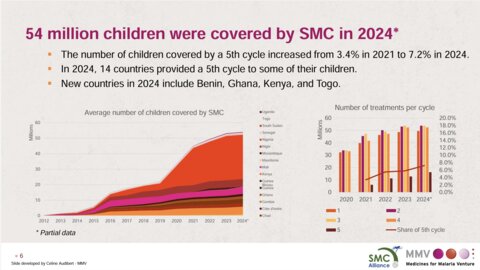8th SMC Alliance Annual Review: Key takeaways

Since the first gathering in Niamey in 2018, the Seasonal Malaria Chemoprevention (SMC) community has convened annually to review progress and strategically plan activities that advance this critical prevention intervention for children at risk of severe malaria during the high-transmission period (typically the rainy season).
The 8th annual Seasonal Malaria Chemoprevention (SMC) Alliance meeting, which was held in Lomé, Togo from 25 to 28 February 2025, brought together over 100 representatives from 22 countries, from the World Health Organization (WHO) Global Malaria Programme, ministries of health, national malaria programmes, researchers, implementing partners and academic institutions. The event provided a critical platform for assessing progress, addressing emerging challenges and defining a new strategic direction for SMC and broader malaria chemoprevention efforts that protect millions of children from malaria in Africa.
The newly released SMC Alliance Annual Meeting Report captures the key discussions, insights, strategic priorities and over 30 country case studies that emerged over the course of the meeting, serving as both a record of progress and a roadmap for action. As a result of the meeting, the Alliance has launched a new strategic framework focusing on the following three goals:
- Driving innovation in SMC delivery and co-delivery with other services
- Securing sustainable financing through advocacy, partnerships and investment cases
- Enhancing coordination across chemoprevention strategies through strengthened governance and the proposed creation of a chemoprevention umbrella group.
Malaria Consortium’s representatives attending the meeting reflected on discussions and insights, which have been distilled into five key lessons. These highlight the need for integration, cost-effectiveness, monitoring and evaluation, digitalisation and research to optimise SMC impact and sustainability, which align with the Alliance’s new strategic framework.
1. Integration with other health services can maximise impact
Many countries shared successful examples of integrating SMC with other health services, such as routine immunisation, malnutrition screening, and community-based case management, demonstrating its potential to expand coverage of other interventions at minimal additional cost. While integration presents logistical and operational challenges, it creates opportunities for collaboration among national programmes within a country to improve overall health outcomes. Given increasing funding constraints, maximising efficiency through integration will be essential.
2. Funding cuts require greater cost-effectiveness and national ownership
Global health financing uncertainties, including recent development funding cuts, have put increased pressure on countries to implement cost-effective SMC strategies. This requires critically evaluating and prioritising programme expenditures to reduce unnecessary costs as far as is feasible. Strengthening integration with other interventions and advocating for national ownership of SMC programmes can also help to maximise efficiency and is also key to ensuring sustainability. Governments must commit domestic resources to sustain these life-saving interventions in the long term.
3. Stronger coordination and standardisation are needed across countries
The meeting underscored the importance of aligning SMC monitoring and evaluation frameworks across implementing countries. A harmonised approach among ministries of health, national malaria programmes and implementing partners will help maintain programme quality and maximise impact. Additionally, collaboration between SMC and other chemoprevention strategies, such as perennial malaria chemoprevention (PMC) and intermittent preventive treatment in school-aged children (IPTsc), could enhance the overall effectiveness and sustainability of malaria prevention efforts.
4. Digitalisation in SMC needs clear operational models for sustainability
The use of digital tools in SMC implementation is growing, offering benefits such as improved data accuracy, real-time monitoring and cost reduction. However, discussions at the meeting emphasised the need for clear operational models to ensure the sustainability of digitalisation efforts. Future strategies should prioritise building robust, cost-effective digital systems that support real-time, data-informed decision-making and long-term programme optimisation.
5. Research and evidence are critical for guiding future SMC policy and implementation
Ongoing research is essential to refine SMC delivery models, especially as programmes consider expanding to older age groups and integrating malaria vaccines. Evidence on drug resistance, cost-effectiveness and the co-implementation of SMC with other health services will inform policy decisions and enhance programme sustainability. Research into alternative, cost-effective SMC delivery models will be crucial in adapting to the changing funding landscape.
Moving forward: Strengthening SMC for long-term impact
“The discussions at the SMC Alliance annual meeting reaffirmed that SMC and broader malaria chemoprevention interventions remain vital tools in the fight against malaria,” said Christian Rassi, Programme Director of SMC at Malaria Consortium. “To sustain and optimise their impact, countries must embrace integration, prioritise cost-effective delivery strategies, enhance data-informed decision-making, advance digital innovations and invest in research. Malaria Consortium remains committed to supporting and working alongside the Alliance, governments, partners and donors to implement these key learnings in order to protect vulnerable children from malaria.”
By advocating for enhanced efficiencies, greater national ownership and sustainable financing, we can help secure the future of SMC and accelerate progress towards malaria elimination.
To learn more about the important work and updates of SMC Alliance, please check out and subscribe to its quarterly newsletter here.
Source: Malaria Consortium